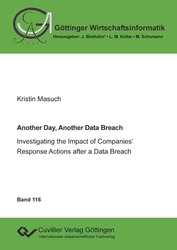| Areas | |
|---|---|
| Serie de libros (97) |
1382
|
| Nachhaltigkeit |
3
|
| Gesundheitswesen |
1
|
| Letra |
2372
|
| Medienwissenschaften | 16 |
| Teología | 57 |
| Filosofía | 102 |
| Derecho | 423 |
| Economía | 853 |
| Ciencias sociales | 417 |
| Ciencias del deporte | 48 |
| Psicología | 233 |
| Educación | 190 |
| Historia | 183 |
| Arte | 111 |
| Ciencias culturales | 166 |
| Literatur | 117 |
| Lingüística | 89 |
| Ciencias Naturales |
5408
|
| Ciencias Ingeniería |
1798
|
| General |
98
|
|
Leitlinien Unfallchirurgie
5. Auflage bestellen |
|
Erweiterte Suche
Another Day, Another Data Breach (Volumen 116) (Tienda española)
Investigating the Impact of Companies‘ Response Actions after a Data Breach
Kristin Masuch (Autor)Previo
Lectura de prueba, PDF (270 KB)
Indice, PDF (110 KB)
Data breaches, which compromise the confidentiality of customer data that a company stores, have become a common problem for many companies today. Due to sophisticated attacks that are evolving constantly, companies have no chance to prevent data breaches completely. Once a company becomes a victim of a data breach, it is legally obligated to disclose the event to its affected customers. This announcement often leads to a financial disaster due to public disclosure of a data breach that negatively impacts a company’s market value, as well as customers’ relationship with the company, and in a worst-case scenario, it can threaten the company’s very existence.
Currently, recommendations and standards to minimize these losses are lacking, but affected companies do not remain inactive and react ad hoc to the double-edged negative consequences by developing strategies, the so-called response strategy, to limit damage through the public announcement of the data breach. However, it remains unclear whether and how these response strategies make an impact.
This dissertation analyzes response strategies’ effects via four studies and clarifies whether and how these strategies can impact negative consequences.
| ISBN-13 (Impresion) | 9783736976511 |
| Formato | A5 |
| Idioma | Inglés |
| Numero de paginas | 204 |
| Laminacion de la cubierta | Brillante |
| Edicion | 1. |
| Serie | Göttinger Wirtschaftsinformatik |
| Volumen | 116 |
| Lugar de publicacion | Göttingen |
| Lugar de la disertacion | Göttingen |
| Fecha de publicacion | 28.07.2022 |
| Clasificacion simple | Tesis doctoral |
| Area |
Economía
Informática |
| Palabras claves | Security incident, Data breach, Health data breach, Breach of confidentiality, Customer data, Employee data, Negative consequences, Process of response strategies, Meaningfulness of response action, Effective design of response strategies, Response recommendations, Recovery recommendations, Data breach response strategy, Data breach recovery strategy, Data breach response actions, Data breach recovery action, Health data breach recovery action, Severity, Justification, Framing severity minor, Apology, Remorse, Com¬pensation, Direct effect, Side effect, Impact on stock value, Event study, Expectation-confirmation theory, Assimilation-contrast model, Justice theory, Digital challenges, Cross-cultural analysis, Signaling theory, Signals, Message credibility, Sicherheitsvorfall, Datenpanne, Gesundheitsdatenpanne, Verletzung der Vertraulichkeit, Kundendaten, Mitarbeiterdaten, Negative Folgen, Prozesse von Antwortstrategien, Bedeutung von Antwortmaßnahmen, Effektive Gestaltung von Antwortstrategien, Antwortempfehlungen, Wiederherstellungsempfehlungen, Antwortstrategie bei Datenpannen, Wiederherstellungsstrategie bei Datenpannen, Antwortaktionen bei Datenpannen, Wiederherstellungsmaßnahmen bei Datenpannen, Wiederherstellungsmaßnahmen bei Datenpannen im Gesundheitswesen, Schwere der Datenpanne, Rechtfertigung, Justifikation, Framing der Schwere der Datenpanne, Entschuldigung, Reue, Entschädigung, Kompensation, Direkte Wirkung, Nebenwirkung, Auswirkung auf den Aktienwert, Ereignisstudie, Erwartungs-Bestätigungs-Theorie, Assimilations-Kontrast-Modell, Gerechtigkeitstheorie, Digitale Herausforderungen, Bewertung von Kapitalbeteiligungen, Capital Asses Pricing, Nachrichtenglaubwürdigkeit, Message Credibility, Interkulturelle Analyse, Signaltheorie, Signale, Glaubwürdigkeit der Nachricht |








